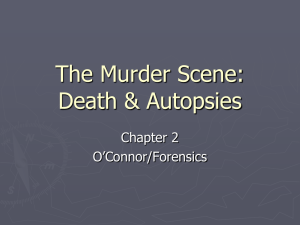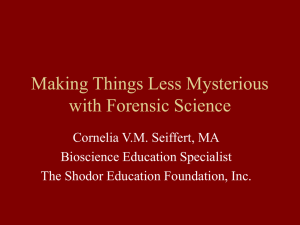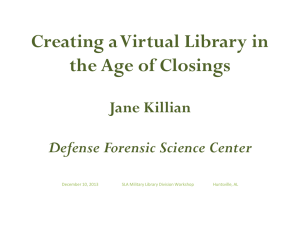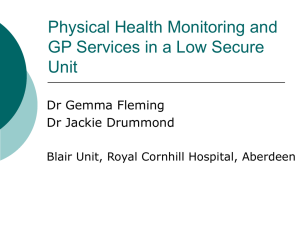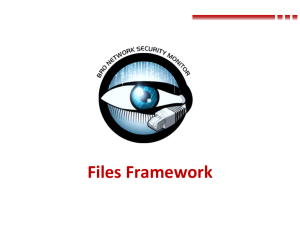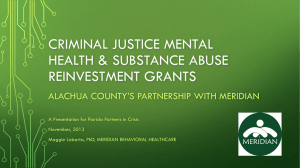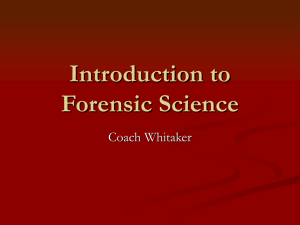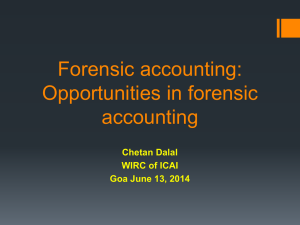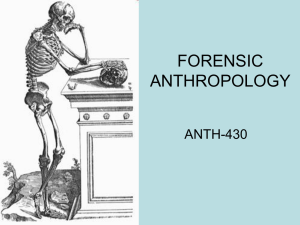Forensic LOGO Noriega
advertisement
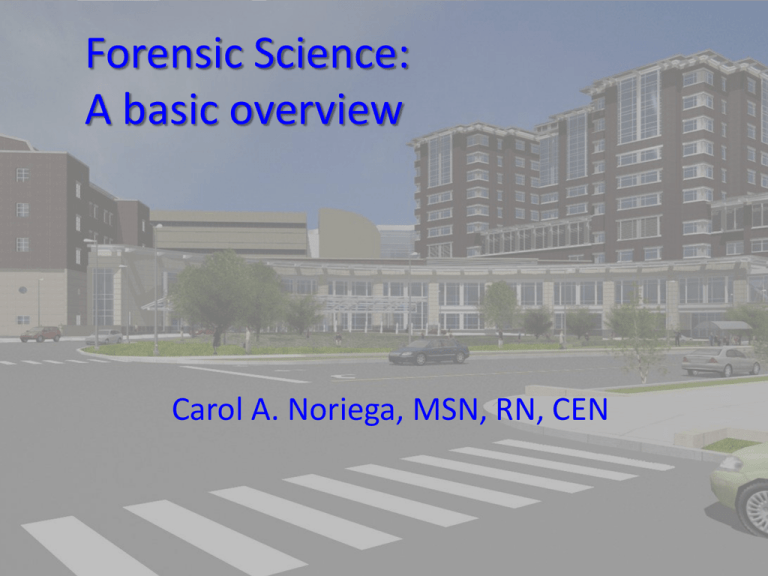
Forensic Science: A basic overview Carol A. Noriega, MSN, RN, CEN Forensic Science Defined “FORENSIC” - “pertaining to the law”. It is also noted that the word forensic is an adjective and should be used in conjunction with a noun; such as Forensic Science. -Tabers Cyclopedic Medical Dictionary Clinical Forensic Practice • Pioneer of forensic nursing • “Health care providers can no longer work in isolation from the legal issues previously delegated to law enforcement.” Virginia Lynch MSN, RN • Maintain a high index of suspicion. Clinical Forensic Practice “Emergency care providers are usually the first to see the patient, first to talk with the family, first to handle the patients property and first to deal with specimens and evidence.” [The Healthcare Provider] must be able to recognize that a potential forensic issue exists. -Linda McCracken, RN, Nurse Clinician and Forensic Nurse Consultant; Potential Forensic Cases – – – – – – – – – individuals involved in MVC attempted homicide or suicide; injuries involving firearms, knives, or other weapons; accidents (including fire, falls or electrocution) work-related accidents overdoses or illegal drug use sexual or non-sexual assaults anyone in police custody for any reason sudden unexpected death Why should Trauma Providers Care? • Trauma care providers are very good at finding out what is injured. We excel in the “E” of the mnemonic of trauma care: “EXPOSE” the patient to see what is hurt. • Unfortunately, the act of “expose” can inadvertently destroy valuable evidence. – i.e. cutting through the bullet hole, instead of around it. • Is there a better way? The Better Way… • A Collaborative, consistent approach, between all disciplines when dealing with victims and/or victimizers in the health care setting. • Linda McCracken, RN developed a mnemonic called: The Forensic ABCs of Trauma Care The Forensic ABCs of Trauma Care A Assessment of the victim Does the injury match the story? The Forensic ABCs of Trauma Care B = Bridge the gap – liaison with outside agencies • law enforcement, EMS, medical examiner, etc. The Forensic ABCs of Trauma Care • C = Chain of custody – know the methods of evidence collection – establish continuity of evidence possession and disposition The Forensic ABCs of Trauma Care D = Documentation of findings – Stay factual The Forensic ABCs of Trauma Care • E = Evidence – Preserve and collect when possible The Forensic ABCs of Trauma Care • F = Families – keep them informed (as appropriate) The Forensic ABCs of Trauma Care G • Going to court Be prepared to provide written or oral testimony The Forensic ABCs of Trauma Care H • Hospital policies - Know where and how to access your institution’s or agencies forensic protocols The Forensic ABCs of Trauma Care I • Index of Suspicion • Be aware of signs of abuse and violence. • …does the story match the injury? Assessment of the Victim Bridge the Gap Chain of Custody Documentation of Findings Evidence Family Going to Court Hospital Policies Index of Suspicion KEY SKILL: Critically Noticing • The practice of “critically noticing” on the part of health care practitioners is essential. • The intuition of an experienced seasoned clinician, coupled with an accurate assessment, is a powerful combination. Summary • Forensic Science is the combining of Science and law. • Health care providers play an integral part of the healthcare team as well the legal team • Use the mnemonic “The Forensic ABCs of Trauma Care” as an organized method of a forensic assessment. • “Critically Noticing” is an essential practice of healthcare providers. Referenecs • Eldridge, K. Assessment of trauma nurse knowledge related to forensic practice. Journal of Forensic Nursing 4 (2008) 157-165 • Lynch, V. A. Forensic Nursing, 2006 • McCracken, L. Living forensic: A natural evolution in emergency care. Accident and Emerg Nurs J. 7, 4, 211-216, 1999 • McCracken, L. The forensic ABC’s of trauma care. Canadian Nurse. 97, 3, 30-33, 2001 • Pyrek, K. M. Forensic Nursing, 2006 Questions? 8:00 AM 2:30 PM UK Healthcare ‘Trauma-tizers’ 2012 Kentucky Tough Mudder Finishers Carol Noriega, MSN, RN, CEN carol.noriega@uky.edu

